Is It Ok To Drink Water After Communion?
Enjoying the sacred ritual of communion is an integral part of Christian worship. It’s an act symbolic of Jesus’ sacrifice and serves to remind worshippers of His love and grace. With the bread and wine representing the body and blood of Christ, there has been an age-old debate concerning what can and should be consumed immediately following this honored tradition. An often asked question with varying answers is whether it’s OK to drink water directly after communion.
Delving into this subject, we aim to unravel the different perspectives that shape this conversation. The intention is to provide answers to this question from different denominations and church practices, empowering you with information on the topic. This article serves to broaden your understanding and perhaps encourage discussions within your faith communities about practices surrounding communion and what is deemed appropriate or not.
Historical and Denominational Perspectives
Views on whether it’s acceptable to drink water or any other beverage after communion significantly diverge along denominational lines and historic church customs. Typically, in Roman Catholic, Eastern Orthodox, and some high church Anglican traditions, it is advised not to consume anything except the offered communion bread and wine during the service. The cardinal idea behind this is to allow the body to absorb the sacred elements undiluted and uninterrupted.
The Catholic Church, in particular, stipulates a traditional fast an hour before receiving communion. The clarity on ‘what and when’ to eat or drink post-communion is not explicit in these traditions. However, in practice, the widespread acceptance is to wait until after leaving the church premises before consuming anything else.
In Protestant and many evangelical churches, the rules aren’t so stringent. Whilst these branches of Christianity still regard communion as a sacred ordinance, the focus shifts more towards the symbolic representation of the bread and wine. In these traditions, drinking water or any other beverage immediately after the communion isn’t observed as disrespectful or inappropriate.
The Essence of Communion
Despite these differences in practice, the central theme of communion transcends the divergence. Communion, otherwise known as the Lord’s Supper or the Eucharist, is fundamentally about reflecting upon the sacrifice of Jesus Christ. It’s a moment of humility where Christians unite to remember Christ’s offering of Himself for humanity’s sins.
This principle applies irrespective of the different practices across denominations. If you’ve grown up in a church that refrains from drinking water immediately after communion, it likely is a norm based on reverence for the sacrament’s spiritual significance. For others where no such convention exists, it doesn’t equate to a lesser level of respect or acknowledgment of what the communion represents.
In essence, it’s more about personal conviction and understanding of the sanctity of the Eucharist, than about adhering to a universal standard. However, it is advised to respect the practices of the church you attend or visit. If any doubt arises, your church leadership would be the ideal source for guidance.
Practical Considerations
The communion process varies among churches, with some using traditional communion vessels, while others prefer pre-packaged communion cups for hygiene and convenience. These cups like the ones from The Miracle Meal, come pre-filled with juice and wafer which can be silently and easily opened, allowing for a smooth and unbroken communion experience.
The plastic cups are recyclable, carry a shelf life of a year and eliminate the need for any preparation. They are particularly practical for large congregations, home churches, or outdoor services where facilitation of traditional communion might be challenging.
Conclusion
To sum it up, the etiquette of drinking water or anything else immediately after communion largely depends on your Church’s traditions and regulations. It’s broader than a binary yes or no answer and rooted in the cultural, theological and historical framework of your respective denomination.
Whether it’s about using pre-packaged communion cups, or the question about drinking water post-communion, we encourage you to facilitate a conversation within your faith community to enrich your understanding and practices. To explore more about our pre-packaged, easy-to-use communion cups, visit our online store to simplify your communion experience while preserving the sanctity of this sacred Christian act.






